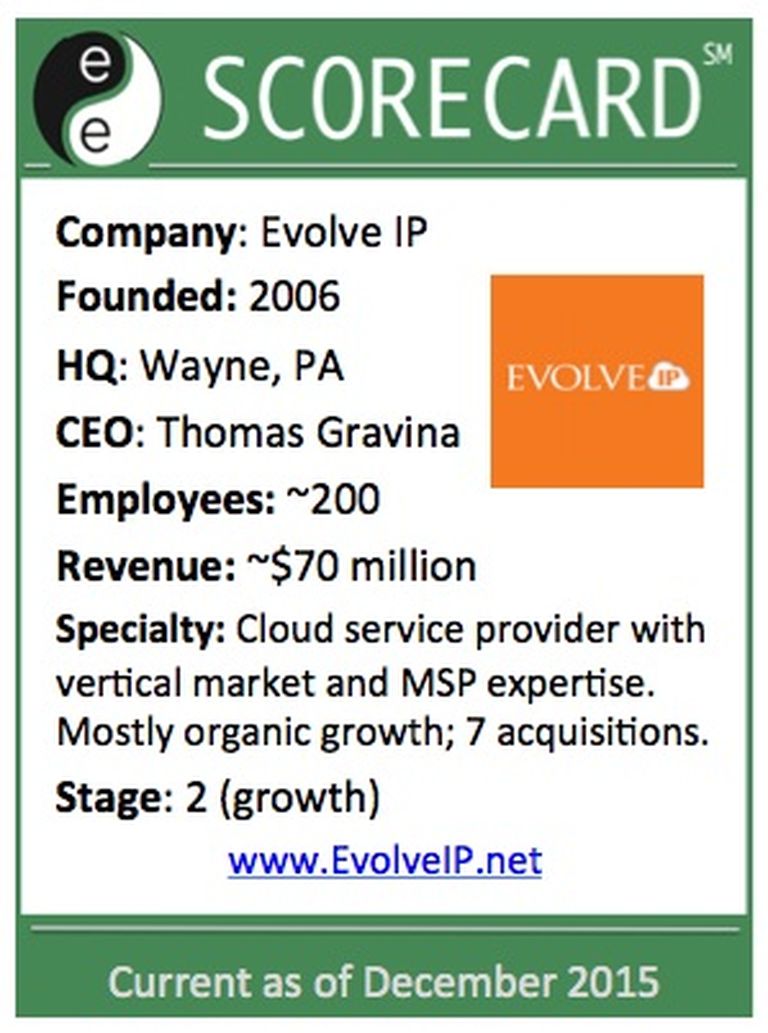
On the one hand, Evolve IP has been acquiring MSPs and IT service providers at a rapid pace. But on the other hand, M&A (mergers and acquisitions) represent less than 15 percent of Evolve IP's overall business. So, how is the cloud services provider balancing organic and M&A growth? President Guy Fardone shared the details with ChannelE2E.
First, some background: Evolve IP acquired A.P.T. Consulting last week -- the parent company's seventh acquisition since 2007. While Evolve is a CSP that sells direct and through partners, A.P.T. is a managed IT service provider focused on the veterinary medicine and pharmaceuticals verticals.
The casual observer might assume that Evolve IP is buying up MSPs to ramp revenue, lift the company's valuation and prepare for a lucrative exit of its own. But take a closer look and listen to the strategy. It sounds like Evolve IP is focused on long-term business growth and execution.
Founded in 2006, the company has grown to roughly $70 million in revenue -- and the growth business is mostly "an organic story," says Fardone."We do acquisitions in an opportunistic way. M&A is part of our strategy but it's not the primary driver of our growth."
Most of the deals involve (A) a specific geography, (B) talent or (C) specific vertical market expertise, he says.
MSP Acquisition: Why Evolve IP Purchased A.P.T.
Such was the case with the latest deal. Evolve IP and A.P.T. are practically neighbors in the Philadelphia area. But this deal wasn't about geographic M&A. Instead, Evolve IP saw an opportunity to expand its portfolio of vertical market bundles -- this time in the veterinary and pharmaceuticals verticals.

"What they bring to the pharma and veterinary healthcare market is huge," asserts Fardone. "They're attractive for two reasons. First, they only do cloud compute. Second, they only focus on those two vertical markets."
Evolve IP says their business strategic doesn't involve a secret sauce: Indeed, it mostly comes down to offering IaaS, bolting on RMM and help desk services in the MSP space, and adding specific application support atop IaaS in a vertical market way.
"I don't want to say our strategy is a no-brainer but it's certainly not a complex strategy," says Fardone. "It's going to come down to execution. Pure execution."
The company's business model involves a mix of (1) direct sales, (2) channel partners that are master agents and small local players and (3) private label partners. Roughly 50 percent of the business flows through partners, though Evolve IP itself is a partner that works closely with VMware and BroadSoft, along with Microsoft and Google.
Thinking Long Term
Instead of striving for a fast built-and-exit strategy, Evolve IP sounds like it's building for the long haul. The leadership team has been involved in roughly four dozen M&A deals during their careers -- mostly on the buy side. So scaling acquired cloud businesses shouldn't be too difficult, he adds. "The whole nature of the cloud is extremely scalable," says Fardone.
Evolve will also strive to scale its employee ranks -- from a current headcount of about 200, with plans to hire another 80 people or so in the next year. Most of the new recruits will focus on sales, engineering, project management and support.
In terms of culture, training is part of the company's core DNA. The company's associate base has more than 25,000 hours of training, and over 50 associates on the team are VMware certified. But the training isn't just on the tech side. It also focuses on selling, business etiquette, support, Six Sigma and more.
Bottom line: Despite all the M&A, Evolve IP remains a long-term play. "We're not serial entrepreneurs," says Fardone. "Everything we do involves a long-term focus. This whole cloud industry is in its infancy in terms of market penetration."




